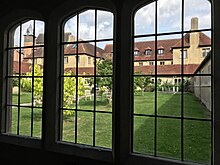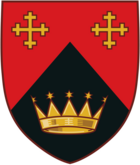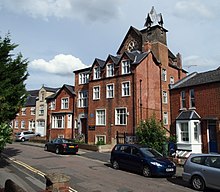St Stephen's House
| St Stephen's House | ||||||||||||
|---|---|---|---|---|---|---|---|---|---|---|---|---|
 The main quad photographed from inside the west cloister, looking towards the King Building | ||||||||||||
 St Stephen's House College Shield Arms: Per chevron Gules and Sable in chief two Cross crosslets and in base a Celestial Crown Or.[1] | ||||||||||||
| Location | 16 Marston Street, Oxford | |||||||||||
| Motto | Video caelos apertos[1] (Latin) | |||||||||||
| Established | 1876 | |||||||||||
| Named for | Saint Stephen | |||||||||||
| Principal | Robin Ward | |||||||||||
| Undergraduates | 5 | |||||||||||
| Postgraduates | 65 | |||||||||||
| Website | www | |||||||||||
St Stephen's House is a theological college in Oxford, England affiliated with the Church of England.[2] From 2003 to 2023 it was a permanent private hall of the University of Oxford.[3]
The college typically matriculates a small number of undergraduate students (just 5 in the academic year 2022–23),[4] but has graduate students in a number of fields including theology,[2] Byzantine studies,[2] education,[5] and music.[5] Between 2003 and 2023, roughly one quarter of the students were pursuing professional training as classroom teachers, and another quarter professional theological and ministerial training as priests, with the other half following a diverse range of studies and research, many remotely or on a flexible basis.[5]
The hall is rooted in and has a history of Anglo-Catholicism.
History
[edit]
St Stephen's House was founded in 1876 by members of the Oxford Movement within the Church of England, and was originally located in the very centre of Oxford, on what is today the site of the New Bodleian Library.[6] Its principal founder was Edward King, Regius Professor of Moral and Pastoral Theology at Oxford and later Bishop of Lincoln.[6]
In 1919 the college relocated to new buildings in Norham Gardens, near the University Parks and Lady Margaret Hall. The college moved again in 1980, having outgrown its earlier buildings, and now occupies the former Anglican Monastery of the Society of St. John the Evangelist (Cowley Fathers).[6]
The college was an "Associated Institution" of the University of Oxford, able to matriculate students in the fields of theology and philosophy, until 2003, when it became a permanent private hall of the university.[2]
Buildings
[edit]The college is located in east Oxford, between the Iffley and Cowley Roads (to west and east) and James Street and Marston Street (to north and south), with entrances onto all these roads.[citation needed] Although there are some modern buildings, notably the Moberly Close residential accommodation building,[2] most of the college buildings are older, and have listed status.
Grade I listing applies to the Church of St John the Evangelist, which is the principal college chapel, and an arts centre, as well as housing some teaching and research facilities in its sacristies and song school.[7] Constructed in 1894–1896 to a design by George Frederick Bodley (1827–1907), it has held grade I listing since 1968.[7] The castellated west tower was added in 1902.[8] The east, west, and north-east windows contain stained glass designed by C. E. Kempe (1837–1907) and made in about 1900.[9] The Church also contains painted Stations of the Cross by the late Pre-Raphaelite artist, Edward Arthur Fellowes Prynne, created for the Cowley Fathers between 1918 and 1921.[10]
Grade II listing was applied to the bulk of the college's other central buildings in 1992.[11] This listing includes the college's main cloister built in 1899 to a design by Bodley,[11] the three lesser cloisters, the Benson Building (residential and teaching accommodation built late nineteenth century, probably designed by Clapton Crabb Rolfe),[11] the King Building (residential, teaching, and administrative accommodation, including the college refectory, the library, and the common room, also designed by Bodley),[11] and the two smaller chapels – the Founders Chapel, and the Ninian Comper designed House Chapel.[11]
St John's Church (and sometimes also the college cloisters) has been since 2012 the performance and display venue for SJE Arts Oxford,[12] a society promoting performing arts and music, and which organises an annual summer choral festival at the college site.
The Song School, once the music department of SSJE, and later the residence of the college's vice principal, has since 2008 housed the Centre for Muslim-Christian Studies, Oxford, an independent body whose senior teaching and research staff are mostly current or former members of the Faculty of Theology and Religion, University of Oxford.[13]
Arms
[edit]In 2020, St Stephen's House was granted by the College of Arms the current arms Per chevron Gules and Sable in chief two Cross crosslets and in base a Celestial Crown Or and badge A Cross Crosslet Or surmounted by a closed Book Gules leaved Argent and charged with a key wards upwards Or.[1] The badge is used on the college sports kit.
Prior to this, the college used the assumed arms Gules a Celestial Crown between three Bezants two and one Or, on a chief Sable an Apostolic Eagle between two Crosses crosslet Or.[14]
Principals and fellows
[edit]Principals
[edit]The Head of House is known as the "principal." To date, every person to have held the office has been an ordained Anglican priest.[citation needed]
- 1876–1877 (res.): Robert Moberly
- 1877–1881: ?
- 1881–1884 (res.): John Octavius Johnston
- 1884–1885 (res.): Berkeley Randolph
- 1885–1888 (res.): Charles Myers
- 1888–1895 (res.): Hugh Currie
- 1895–1903 (res.): Charles Plumb
- 1903–1917 (res.): George Bown
- 1917–1919: ?
- 1919–1936 (res.): Gilbert Mitchell
- 1936–1962 (res.): Arthur Couratin
- 1962–1974 (res.): Derek Allen
- 1974–1982 (res.): David Hope
- 1982–1987 (res.): David Thomas
- 1987–1995 (res.): Edwin Barnes
- 1996–2006 (res.): Jeremy Sheehy
- 2006–present: Robin Ward
Honorary research fellows
[edit]Notable honorary research fellows have included:[citation needed]
- Andrew Linzey, theologian, author and prominent figure in the Christian vegetarianism movement
- James Whitbourn, conductor and composer
- Luke Miller, Archdeacon of London
- Norman Russell, former Archdeacon of Berkshire
Alumni
[edit]Many former students, in the tradition of the college, go on to minister in urban priority areas and parishes which suffer poverty and deprivation. The following are amongst the notable former students:
- Jonathan Baker – Bishop of Fulham and the former Bishop of Ebbsfleet
- Norman Banks – Honorary Chaplain to the Queen and Bishop of Richborough
- J. W. B. Barns – Professor of Egyptology at the University of Oxford
- Mark Bonney — Dean of Ely
- Andrew Burnham – former Bishop of Ebbsfleet and former vice principal
- Anthony Caesar – composer
- Alan Chesters – former Bishop of Blackburn
- David Conner – Dean of Windsor (since 1998)
- Stephen Cottrell – Archbishop of York (since 2020)
- Ivor Gordon Davies – Archdeacon of Lewisham from 1972 to 1985.
- Roy Davies – Bishop of Llandaff from 1985 to 1999
- Hovnan Derderian – Primate of the Western Diocese of the Armenian Church of North America
- Mark Elvins – Roman Catholic priest and Warden of Greyfriars, Oxford
- Walter Hooper – literary advisor to the estate of CS Lewis
- William Howard, 8th Earl of Wicklow – Irish peer
- David Jasper – Professor of Literature and Theology at the University of Glasgow
- Jeffrey John – Dean of St Albans
- Eric Kemp – former Bishop of Chichester
- Peter Laister – Rector of Saint Clement's Church, Philadelphia, from 1986 to 1993
- Kenneth Leech – priest and Christian socialist
- Trevor Mwamba – Bishop of Botswana, appears as himself in The No. 1 Ladies' Detective Agency
- Philip North – Bishop of Burnley
- Mark Oakley – Canon Chancellor of St Paul's Cathedral, London
- Gordon Roe – former Bishop of Huntingdon
- John Saward – theologian, fellow of Greyfriars, Oxford[15]
- David Silk – former Bishop of Ballarat in the Anglican Church of Australia
- Glyn Simon – former Archbishop of Wales
- Michael Spence – vice-chancellor of the University of Sydney
- Tim Thornton – Bishop of Truro
- Stephen Venner – Bishop to the Forces and Bishop for the Falkland Islands
- Martin Warner – Bishop of Chichester
- William Gordon Wheeler – former Roman Catholic Bishop of Leeds
- Colin Williams – General Secretary of the Conference of European Churches
- A. N. Wilson – writer and newspaper columnist, left after his first year
See also
[edit]References
[edit]- ^ a b c "January 2021 Newsletter (No. 63)". College of Arms. Retrieved 1 February 2021.
- ^ a b c d e "St Stephen's House". University of Oxford. Retrieved 12 March 2021.
- ^ "St Stephen's House". University of Oxford. Archived from the original on 7 June 2023. Retrieved 26 December 2022.
- ^ "Student Statistics". University of Oxford. Retrieved 25 July 2023.
- ^ a b c "About". St Stephen's House. Retrieved 25 July 2023.
- ^ a b c "History". St Stephen's House. Retrieved 12 March 2021.
- ^ a b "Church of St John the Evangelist". British Listed Buildings. Retrieved 13 March 2021.
- ^ Sherwood, Jennifer; Pevsner, Nikolaus (1974). Oxfordshire. The Buildings of England. Harmondsworth: Penguin Books. pp. 340–341. ISBN 0-14-071045-0.
- ^ Sherwood & Pevsner 1974, p. 341.
- ^ James, Serenhedd (July 2019). The Cowley Fathers: A History of the English Congregation of the Society of St John the Evangelist. Norwich: Canterbury Press. ISBN 9781786221834. Retrieved 22 December 2021.
- ^ a b c d e "St Stephen House and Attached Cloisters". Historic England. Retrieved 13 March 2021.
- ^ "About SJE Arts". Retrieved 4 March 2018.
- ^ "Our Location". The Centre for Muslim-Christian Studies, Oxford. Retrieved 13 March 2021.
- ^ University of Oxford Calendar 2010–2011. Oxford University Press. 2010. ISBN 978-0-19-958663-9.
- ^ Fr John Saward. Retrieved 2008-02-11
External links
[edit]- St Stephen's House, Oxford
- 1876 establishments in England
- Permanent private halls of the University of Oxford
- Former colleges and halls of the University of Oxford
- Anglo-Catholic educational establishments
- Anglican seminaries and theological colleges
- Bible colleges, seminaries and theological colleges in England
- Buildings and structures of the University of Oxford
- Anglican buildings and structures in Europe
